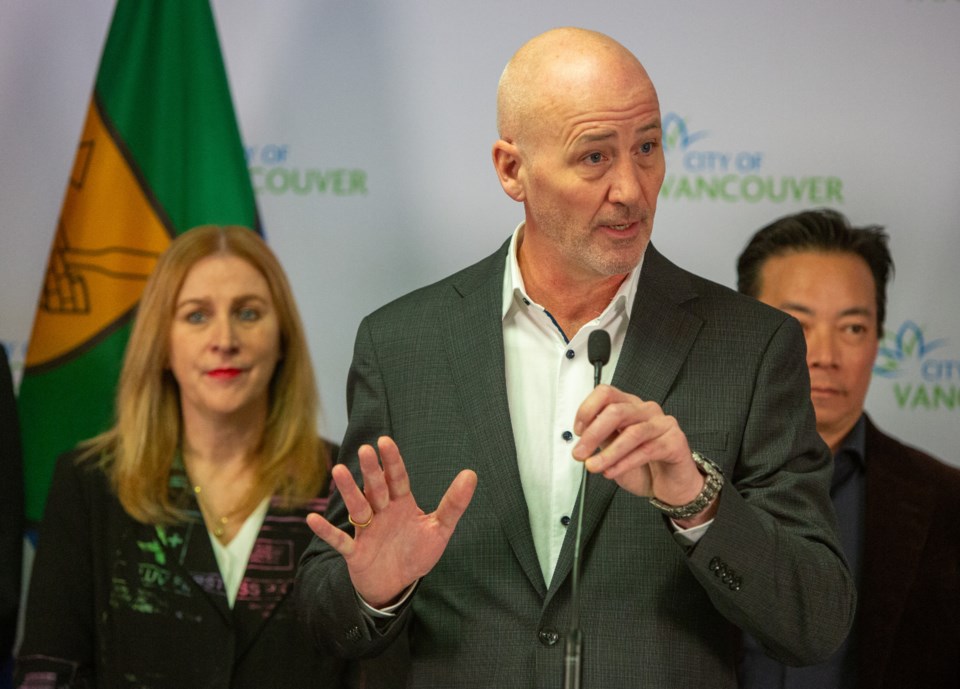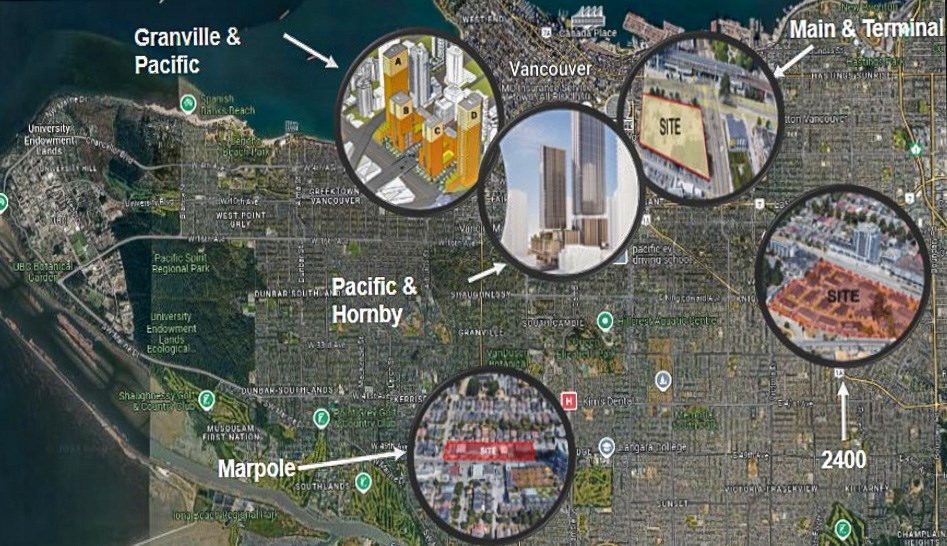Vancouver Mayor Ken Sim announced Thursday that the city is embarking on a strategy to build 4,300 units of market rental housing on five city-owned sites to generate cash flow that could be used to fund affordable housing and community centres.
The pilot project, as it was described by the mayor and senior staff members, is focused on two downtown sites and three others across the city, including the property where the iconic 2400 Motel on Kingsway now stands.
“By leveraging our land, we're not only delivering much needed market rental housing but we're also piloting a new way to generate non-tax revenue for the city, which is in line with the mayor's budget task force recommendations,” Sim told reporters at city hall.
“This means more funding for the things that make Vancouver even better — renewing our community centres, growing the Vancouver Affordable Housing Endowment Fund and investing in projects that make Vancouver an even more vibrant city.”
The project is believed to be the first of its kind in Canada by which a municipality becomes landowner and developer of a property. For years, Vancouver has used this approach with non-market housing, with 13,000 units built and another 2,800 units in the development pipeline.
The Vancouver Housing Development Office (VHDO), which was created in 2023 in response to recommendations in the mayor’s budget task force, will oversee the development of the five city sites.

'Long-term wealth'
Brad Foster, the VHDO’s director of market rental housing, said the task force recommended city staff do more to generate a financial return from the property endowment fund and optimize city-owned land.
The current worth of the property endowment fund, which generates revenue from lease agreements on city-owned sites, was assessed at more than $6 billion in 2024.
“It was established in 1975 with a distinct purpose to generate an annual dividend for the city, so that is basically why we are here,” Foster told reporters in a briefing prior to the mayor’s news conference.
“This is about balancing our portfolios. We've made huge investments on the non-market side. Now we need to make investments into the market side to generate long-term wealth.”
Foster was joined at the briefing by deputy city manager Armin Amrolia and Grace Cheng, the city’s director of long-term strategy and planning. Cheng explained public benefits from the projects will not be made available in the traditional way, where, for example, a developer builds a child-care centre as part of a project.
“There is another definition of public benefit — the ongoing income stream coming in,” she said.
“It will be up to council, and within their jurisdiction, to say how much they want to allocate the ongoing income stream to address the growing infrastructure deficit. It could be renewing a library. It could be renewing a community centre. It could be increasing the capacity of water and sewer.”
'Definitely in the billions'
How much it will cost to develop each site and what the return would be to the city are questions the trio of senior staff could not answer Thursday, noting development partners still have to be sought, agreements reached and rezoning approved.
“The first task here is to get these sites zoned for highest and best use under market rental tenure — that's the first task,” Foster said. “The next task will be, ‘How do we get them built?’ And that's where all the finance discussions will take place.”
At the same time, Amrolia said staff does have a rough estimate of the financial return to the city.
“That's all part of the market sounding, and we couldn't possibly build without having that information,” said Amrolia, who described the project as a made-in-Vancouver response to the city’s housing crisis.
Added Foster: “You're definitely in the billions. You're also in the billions in terms of financing because these are very expensive construction projects. This is the big leagues of development and we aim to not shy away from that because we have to be bold with these assets. That's what they're here for — to generate long-term revenue for the City of Vancouver.”
$90K to $194K household income
When built, Amrolia said units would be eligible to be rented from people whose household income is between $90,000 and $194,000, based on today’s market rates.
“You'll have to qualify within that income band to actually rent the unit,” she said.
The five sites include a large piece of property at Pacific and Hornby, where a 54-storey and a 40-storey building are proposed, with plans for 1,136 homes, ranging from studio to three-bedroom units.
Other sites are located at the southwest corner of Main and Terminal, which currently serves as a parking lot; and the north end of the Granville Bridge, where four towers are proposed.
The 2400 Motel site at 2400 Kingsway, and a property in Marpole at Granville and 67th Avenue are the others.
Some facts about the city's property endowment fund, which includes approximately 440 properties:
• 400 active parcels, with a relative breakdown of 25 per cent commercial/industrial, 16 per cent residential, 27 per cent land (actively leased).
• Balance being parks and civic assets.
• 40 long-term residential/commercial ground-lease sites comprised of more than 2,000 strata-leasehold units, which are predominantly in Southwest False Creek and Champlain Heights
• This count excludes certain mixed-used properties which are held jointly by multiple city funds (e.g. capital fund and property endowment fund).
X/@Howellings




